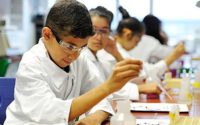Practical Work Makes The Learning Process Easier
Science is, essentially, a body of knowledge about the existing world, so imparting the knowledge of science is unavoidably an objective focused activity. The purpose is not just to help students improve their knowledge of the natural world, but to grow it in a specific direction – to bring their thoughts and understandings closer to those of the scientific community.
Taking the knowledge of science at school is not building of ideas or discovering something which is new, instead it is knowing what it is already known by others. It is complicated which is why there are special ways to have it understood by the students. And the best way to do it is through practical work. When objects are used and students actually observe the changes that are taking place or what actually is inside something is when they easily understand it.
Practical work is an essential feature in science education. Getting the students engaged in practical activities is an effective way of keeping them involved in their education.
Practical work helps the students in grasping things more clearly. When they actually perform or see their teachers performing what they are being taught in writing the brain tends to comprehend things more easily. Performing hands-on practical work inspires pupils to learn science and most of them actually want to do more. Without practical work, the students may find science dull and would be unenthusiastic to take up careers that are science based.
Here is what involving in practical work will help the students with:
- Educates students on laboratory skills
- Cultivates different outlooks of science such as objectivity and broad-mindedness
- Encourages the students by invigorating the fun element and creating interest
- Makes the students experts in scientific methods and develops proficiency in using it
- Enriches the learning of scientific knowledge
A knowledgeable teacher will always have practical work with certain learning goals. A variety of methods can be implemented in just a single practical task to help the students in learning different outcomes
While some practical works teach about objects and perception that from which the students are expected to remember what their observations were the others are meant to devise links between the perception and the scientific ideas. Students usually find the second one a bit more difficult as it involves both observing and doing. The task should be designed in a way to structure the efforts of students to make the links.
Practical work to grow the knowledge of the students in science would be most effective when:
- The designed task accentuates the main objective
- The learning objectives should be limited and clear in any task
- A plan is used to invigorate the thought process of the students before so that the practical task is answering a question which the student already has in his/her mind.
There is a difference between how scientists work and how the students learn in a laboratory while studying. Practical work in terms of teaching scientific knowledge is best understood as communication rather than discovery.







